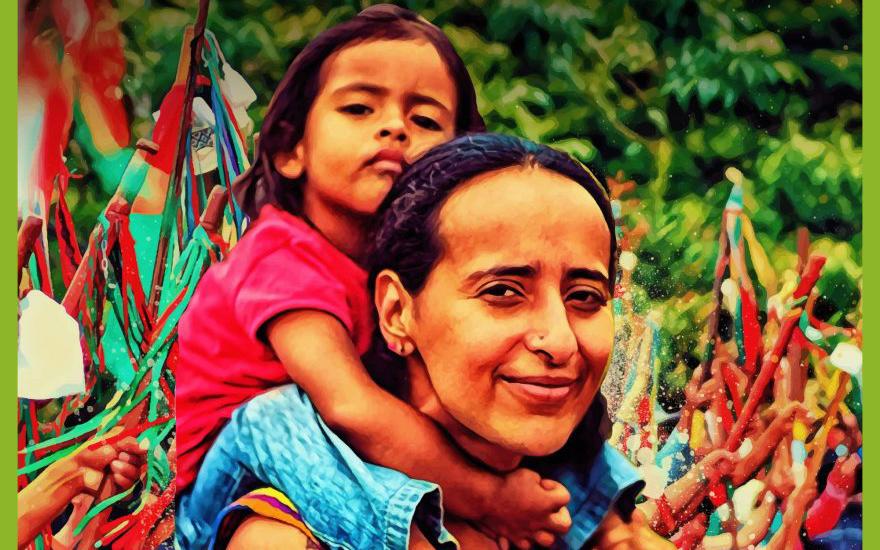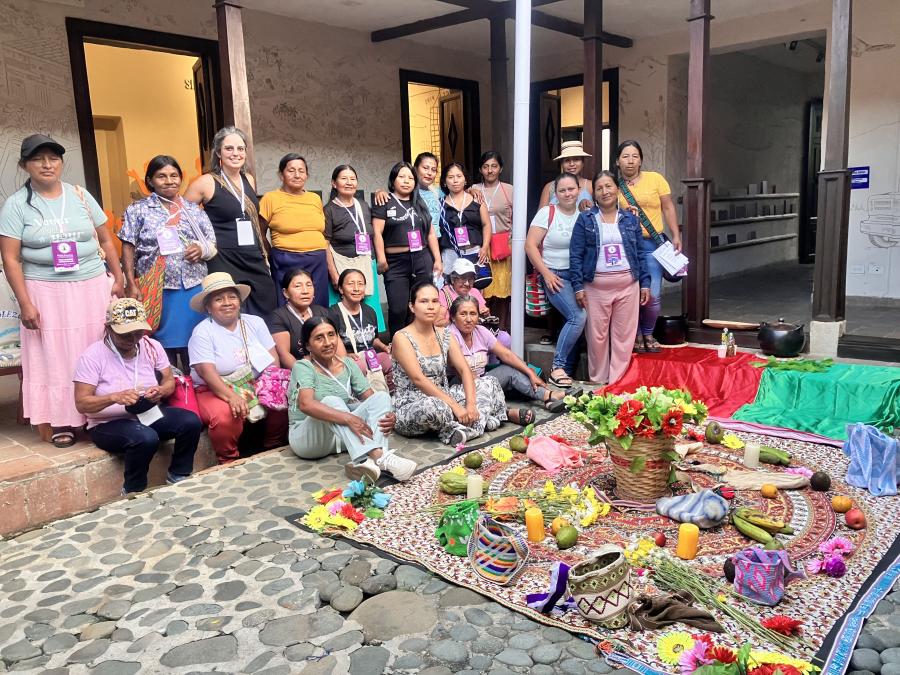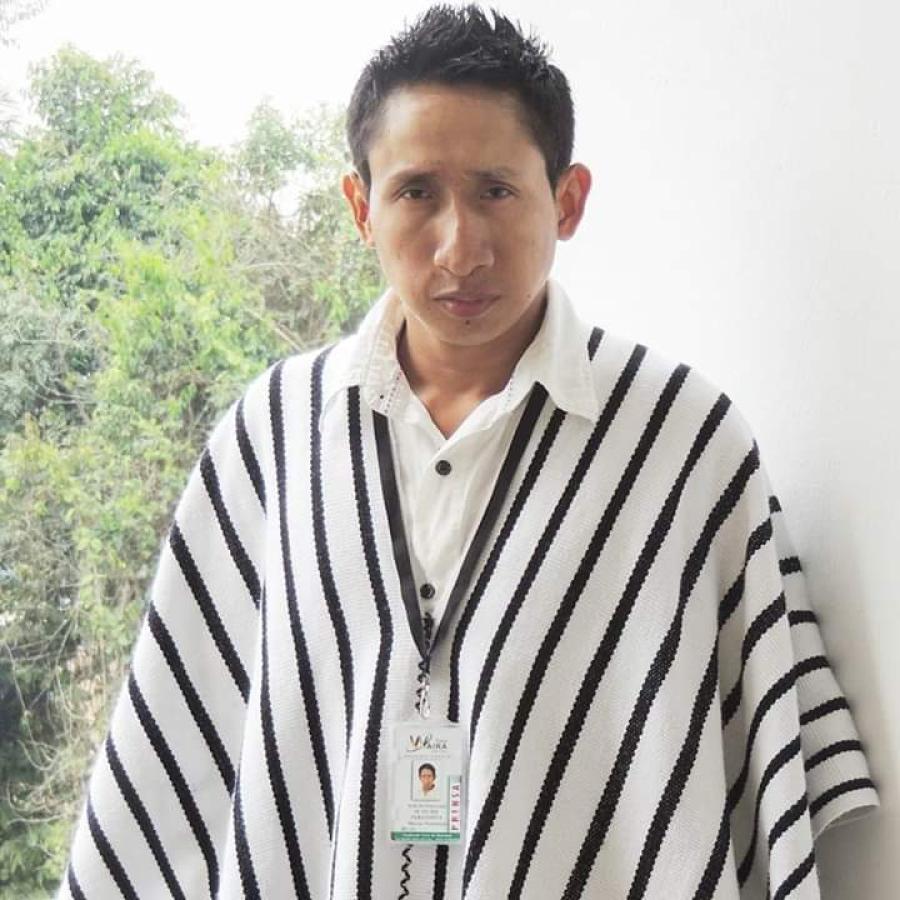
By Rebecca Kirkpatrick (CS Intern)
More than 26 human rights defenders have been murdered in Cauca, Colombia, since the beginning of the COVID-19 pandemic. According to Reporters Without Borders, Colombia currently ranks 134 out of 180 countries on the 2021 World Press Freedom Index. Violence against Indigenous leaders and activists in Latin America, as well as against the non-Indigenous activists who work with them is, unfortunately, neither new nor unusual. Cultural Survival’s Indigenous Rights Radio recently spoke with Vilma Rocío Almendra (Nasa and Misak), a member of the Pueblos en Camino initiative, and Diana Puyazos, a newscaster with the Asociación de Cabildos Indígenas del Norte del Cauca (Association of Indigenous Councils of Northern Cauca), to discuss this ongoing violence and to specifically address the murder of Beatriz Cano, a communicator with the Asociación Cabildos Indígenas del Norte del Cauca.
On June 4, 2021, Cano, a fierce defender of the rights and territories of the Nasa people, along with her five-year-old daughter, her partner, César Galarza, and community member Floresmino Tróchez, who are also members of the Asociación de Cabildos Indígenas del Norte del Cauca, was attacked in her car by a group of armed men at a routine checkpoint in the town of Santander de Quilichao. The men opened fire first on police officers who had just granted Cano and her companions passage through the checkpoint. “When they were about to give us passage so that we could continue in the car, the sound of gunshots began to ring out. At first I thought it was gunpowder, until I felt that my feet were wounded," said Galarza. Everyone in the car was seriously injured, and Cano succumbed to her injuries in hospital three days later, on June 7, 2021. The two police officers, Carlos Delgado Jiménez and María Isabel Angulo Rivera, as well as two other civilians and members of the Asociación Cabildos Indígenas del Norte del Cauca, Aleida Perafán and Juan David Guegue, were also killed in the attack.
“The war situation we are living in this territory called Colombia is not new, is it?” Almendra said on the Indigenous Rights Radio Program. “...This so-called Colombia was established with very serious forms of domination that we are still experiencing, such as armies, right? How armies defend power and what they do is they subjugate with force those who oppose the interests of a so-called nation state.” The Nasa people have experienced a great deal of violence at the hands of the State over the years. Encounters with state aggressors have led to the deaths of many Indigenous community members, including José Abelardo Liz—a Nasa Indigenous communicator killed in a military attack on August 13, 2020—and Eider Campo Hurtado, a Nasa journalist who was killed by four heavily armed men in a raid on his house on March 4, 2018.
“And it is not only happening in Colombia, Mexico, Guatemala, Venezuela, but all over the world,” Almendra stated. “In other words, it is a new world order that puts the States, public policies, territories and everything that can dominate, usurp and commercialize in a position where a few can accumulate profits, which are the transnational and corporate elites.” According to the Human Rights Watch, over 400 human rights defenders have been killed in Colombia since 2016, when the Colombian government and the Revolutionary Armed Forces of Colombia (FARC) signed a landmark Peace Agreement to demobilize the country’s then-largest armed group and prevent the murder of human rights defenders. Killings of human rights defenders in Colombia have increased, however, as a result of paramilitary groups fighting for control of territory for illegal activities such as coca production. “Another thing that happened at the same time as the failure to comply with everything that was proposed...was that the number of assassinations of social leaders in this country increased,” stated Almendra. “So here there has always been death, here there have always been selective assassinations, but after the signing of the agreements we have already had almost 300 signatories of peace assassinated.”
The work that the human rights defenders in Colombia do has made them targets for violence and intimidation. Almendra explained, “Because the majority of social leaders that have been killed in this country are [killed] because they have opposed fracking, they have opposed oil exploitation, they have imposed themselves, they have rejected hydroelectric plants, they have rejected mining, they have rejected monocultures.” Human rights defenders like Beatriz Cano put their lives on the line on a daily basis, going up against big corporations and government entities to ensure their land and their communities are protected. “Over the course of almost five years, that is to say the last five years, they have murdered around 67 communicators and all of them have been fighting in defense or for control of territory,” Diana Puyazos told Indigenous Rights Radio. “For example, in the case of what happened with César Galarza,” she said, “who apart from leaving this space as a communicator, is an artist, he is also a musician. So, since through his lyrics he had been denouncing different situations that occur within our territories and since, let us say, there is this persecution, this persecution for those who raise their voice or for those who denounce everything that is occurring within our territories, then there is a total risk from the public forces, by, let’s say, the legal and illegal armed groups that exist within the territories in these scenarios.”
Oftentimes, no one is held accountable for the deaths of Indigenous human rights defenders, Puyazos explained. “At the moment no one is being held responsible for these deaths, nor are there any suspects, or the murders are just attributed to armed groups or the state itself ignores its own involvement in these events,” she stated. “Here in Colombia, there is no access to justice.”
Puyazos’s respect for her late colleague, Cano, is clear. “So she kind of embodied the whole issue of commitment. I believe that if there is something she taught us, it was that, the issue of commitment, but also the issue of the meetings. She made the communicators a family. I think she was a woman with a lot of initiative, with strong opinions, with a lot of dignity, with a lot of commitment even within our communication spaces, because it was not only us here as a network, but also the coordination of other communication collectives at a zonal and regional level.”
The deaths of Beatriz Cano and César Galarza, as well as many other leaders and activists like them, weigh heavy in the hearts of those who knew them and worked with them. Puyazos told Indigenous Rights Radio, “...it has also cost us a lot to recover from all that, precisely because of the type of woman she is. The pain that all this has caused and also the pain of not knowing who did it and not knowing exactly what happened. Why did it happen? It hurts us and it tears us apart, no? But I think that also the legacy that in some way she has left to us….is quite strong…we must also learn not to be afraid and to have the hope intact that someday these things will stop happening…I believe that this is the legacy that she leaves us. To remain steadfast in our work, to commit ourselves more, because if not, then everything would have been in vain.”
In Memoriam: Colombian Indigenous Rights Defenders
This digital report provides a brief overview of the devastating situation in Colombia, based on the names of Indigenous defenders included in Cultural Survival's widely read 2019 "In Memoriam" report profiling 28 Indigenous defenders. This addendum report provides an update to a section of that 2019 report on Colombian defenders, expanding on their important contributions for justice. We honor the legacies of these Colombian defenders and add our voice to the global calls to hold perpetrators accountable for their tragic deaths.
The report was compiled by The Human Rights Investigations Lab for the Americas is housed at the Research Center for the Americas (RCA) at the University of California, Santa Cruz. The RCA co-published this report with Cultural Survival.
In Memoriam: Indigenous Human Rights Defenders Murdered in 2020 in Latin America
In Memoriam: 28 Indigenous Rights Defenders Murdered in Latin America in 2019
Top image courtesy of CLACPI.


